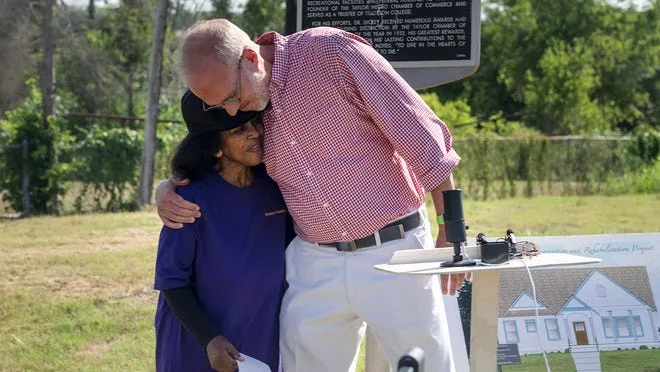TAYLOR — Jennifer Harris was angry when she heard last summer that the house of a Black health pioneer in Taylor being restored as a low-income wellness center had been deliberately burned down.
“I wondered who could have done this,” she said.
She had been involved in the project for 20 years, helping increase community awareness so that $700,000 could be raised to restore the structure, which already had survived a smaller fire and floods.

But Monday, on the anniversary of the fire that burned James L. Dickey’s house to the ground, she said she was overjoyed. She was at a news conference to announce a $500,000 grant from the St. David’s Foundation to rebuild the 2,700-square-foot, two-story house at 500 Burkett St.
It is expected to be open by Juneteenth 2024, said Harris, the president of the board of the Dickey Museum & Multipurpose Center. She said the nonprofit Preservation Texas will help raise another $500,000 needed to complete the $1 million replica of Dickey’s house. It will have exam rooms, offices for doctors, a museum dedicated to Dickey, computers for the public to use and two community health workers to provide advice.
It is in the middle of Taylor’s health equity zone — census tracts identified as having higher than average health risks and socioeconomic burdens, according to a news release from the museum. Census figures show that 58.7% of Taylor’s population is considered to be moderate- to low-income, according to city officials.
“We are honored to support the Dickey Museum & Multipurpose Center and are deeply aligned with its agenda to address health disparities while providing opportunities to amplify the voices of underserved and under-represented communities in Taylor,” Abena Asante, a senior program officer at St. David’s Foundation, said in the release.
Dickey was named Taylor’s man of the year in 1952, making national news because segregation was in full swing and Dickey was Black. He stopped a typhoid fever epidemic in the early 1930s in the Taylor area, started the first clinic for African Americans in Williamson County in 1935, helped get a park set aside for Black residents and got a bridge built to prevent African American children from having to cross a creek to get to school, according to Harris.
Dickey, who died at age 65, also was an advocate for civil rights. He worked for the passage of school bonds, led efforts for federal housing and was a founder of the Taylor Negro Chamber of Commerce.
“He was the Martin Luther King of Taylor,” said Harris, 69, who was one of Dickey’s patients when she was a child.
More:Taylor parade to honor doctor who opened first Williamson County clinic for African-Americans
The renovation of his house to provide medical care for low-income residents had been almost finished when it burned down on July 10, 2022.

“On that day a year ago, the scary part was that it was no longer a historic preservation project, so we wondered how we were going to fund it because most of the money had come from historical preservation organizations,” said Nakevia Miller, the vice president of the museum board.
A Taylor man initially was charged with arson after police said they found him a block from the fire with a torch lighter, according to an arrest affidavit issued two days after the fire. The man told his mother, “I burned down that pagan church, I had to,” according to an affidavit.
A grand jury no-billed the man in September so the case was dismissed. Grand jury decisions are confidential. The man was determined to be incompetent to stand trial, according to court filings.
Bruce Dickey, James Dickey’s grandson, told those at the news conference Monday that he was grateful the house was going to be rebuilt. He lived in the house with his parents for a few years after the doctor died. His childhood bedroom was going to be part of the new wellness center before it burned, he said.
“It still hurts a little bit,” he said of the fire. When he was asked about the arson case being dismissed, he said, “Well, that’s the judicial system.
“No matter what I think about it,” Dickey said, “I will let God handle it.”
Mayor Brandt Rydell, who also spoke at the news conference, said, “Dr. Dickey experienced lots of setbacks and disappointment in his life, yet he persevered and overcame them, and the same thing will happen to this project.”
More:A generation of Black and Hispanic civil rights pioneers left Austin a better place
Dickey’s son, James Dickey Jr., couldn’t make it to the news conference but said in a phone interview that this father was humble and easygoing.
“His life was working at the clinic and helping people,” he said.
James Dickey Sr. graduated from medical school in Nashville, Tenn., but came home to help his mother, who was a widow in Waco, his son said.
He visited Taylor and learned that the only doctor for Black people had left, his son said.
“He came to Taylor with the idea of staying here for a while and then moving on, but he said that God wanted him to stay there,” his son said.



